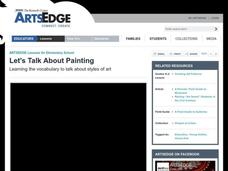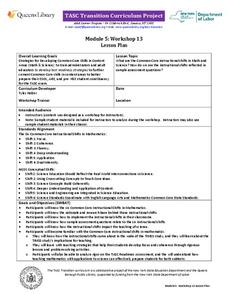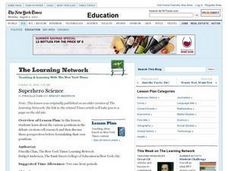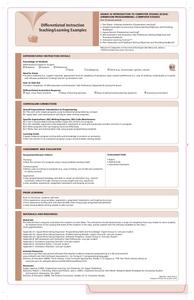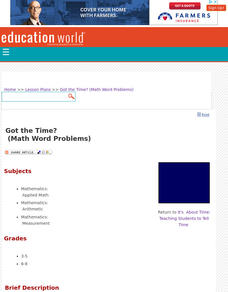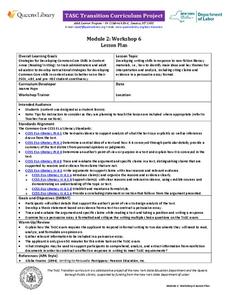Curated OER
Wisdom of the Ages
Students reflect on the different stages of life that humans pass through. They challenge common sense assumptions and critically engage media representations of people at different ages. They determine that media have embedded values...
Curated OER
Let's Talk About Painting
Discuss art and read Matthew's Dream. In this visual arts lesson, learners recognize that there are different styles of art, each with its own techniques. Use simple techniques to understand art and work at stations to complete a style...
New York State Education Department
TASC Transition Curriculum: Workshop 13
The six instructional shifts in this workshop definitely move math and science teachers' understanding of instruction. The workshop, 13th out of a series of 15, asks participants to examine sample tests and to look at how the six...
Curated OER
Design a Coin
Students research a state and then design a quarter for it. They use dough or foil to create the coin! students explore state quarters that have already been issued by the U.S. Mint. Their quarter is for a state that hasn't had one...
Curated OER
Short and Sweet Science
Readers learn how to summarize scientific text and evaluate the advantages, disadvantages, and challenges in writing summaries. They select science-related articles you've pulled and collected from the New York Times and, with a partner,...
Curated OER
"Golden" Years?
The Golden Years? Upper graders may think retirement is a long way off, but in life everything is just around the corner. They consider what it means to retire and the current trend of parents working for their Students. They research...
Curated OER
A New Era for Palestinians
Get a global perspective and examine the challenges facing Mahmoud Abbas, the newly elected president of the Palestinian Authority. Thoughtful classroom citizens write letters to Mr. Abbas, asking him questions and suggesting advice....
Curated OER
Superhero Science
Young scientist explore the various positions in the debate on stem cell research and then discuss these perspectives before formulating their own positions. They must research the topic and beliefs that others have. They will also look...
Curated OER
Is That a Fact?
Investigate popular scientific claims and gather evidence to defend or argue against an author's stance. Writers synthesize information and compose their own "Really?" columns modeled after those found in the weekly "Science Times"...
Curated OER
Organ Music
Middle and high schoolers solve a riddle about the appendix, and explore the paradox surrounding this organ. They research other human body organs to create a paper model of the human body, and write riddles highlighting identifying...
IBM
What Path Will You Follow?
"What do you want to be when you grow up?" is a question every kid has to answer quite often. Here is a instructional activity that will allow them to do some thinking about that very topic, and to learn about some professions they might...
Curated OER
E.T., Are You Out There?
Research the necessary components of a planet that supports life after reading the article "All of a Sudden, The Neighborhood Looks a Lot Friendlier" from The New York Times. After finding their information, middle and high schoolers...
Curated OER
Getting Well
Scholars share ideas about health topics relevant to teens. They read posts on Well, the Times health blog, and produce their own health blog featuring teen health issues. In addition, they read and discuss the article "Well: A Times...
California Polytechnic State University
Australian Geography Unit
At the heart of this resource is a beautifully detailed PowerPoint presentation (provided in PDF form) on the overall physical geography of Australia, basic facts about the country, Aboriginal history, and Australia culture and lifestyle.
Ontario
Animation Programming—Computer Studies
Introduce high schoolers interested in animation programming to fundamental programming concepts so that they can plan and write simple programs.
Curated OER
The Animals Kingdom
Students are introduced to the classification system of animals. In groups, they set up an aquarium in which they must maintain throughout the year. They also observe earthworms and how they react to various stimuli and research the...
EduGAINs
Consumerism, Me and the Natural Environment— Canadian and World Studies
Just as no man is an island, no country is totally independent of other countries. To understand the impact of individual consumer decisions on the global natural environment, class groups consider how the stuff they purchase connects to...
Education World
Got the Time? (Math Word Problems)
Upper graders work with peers to solve word problems related to time and independently solve word problems that involve calculating time. They will show their ability to solve and work through mathematical operations. A worksheet is...
Curated OER
The Growth of America's Production System
Students, assessing a variety of sources, explore the growth of inventions that were brought about by the Industrial Revolution. They analyze labor practices and philosophies within the history of the United States. A timeline is set in...
Library of Congress
The Conservation Movement at a Crossroads: The Hetch Hetchy Controversy
Should wilderness areas be preserved or managed? Class members examine primary source documents, including lecture notes, articles, essays and congressional records to better understand the Hetch Hetchy controversy that created a split...
Curated OER
Biography
Transform a written biography into a video biography! Introduce your learners to the biography format by reading them a few examples (some suggestions are included). Then discuss the factors that make a good biography. What information...
New York State Education Department
TASC Transition Curriculum: Workshop 5
Are video games sports? Pupils investigate this question as well as various nonfiction selections to learn more about claims and the support that defines them. All of the selections mimic the rigor on state tests and encourage close...
EngageNY
TASC Transition Curriculum: Workshop 6
Is a college education necessary for success in today's world? The class investigates the question, along with others at the end of the sixth workshop in a 15-part series. The lesson plan has four parts with multiple activities and...
EngageNY
TASC Transition Curriculum: Workshop 12
How can opinions slant facts? Workshop participants learn how to examine primary and secondary sources and identify the author's point of view. They also examine how visual art impacts the meaning and rhetoric of sources. Full of...



